Women and blockchain
- by piwi215
- 6 posts
-
Gem companies including De Beers have appointed a tech guru to run a digital ledger that ensures their sparklers are not fakes or blood diamonds.Jim Duffy, who previously worked at Oracle and at an artificial intelligence start-up company, will oversee a platform called Tracr that uses the tamper-proof blockchain technology associated with Bitcoin.
The system keeps records of individual gems tracking them from the mine to the jewellers. Each stone is given a unique identity code and hundreds of detailed characteristics – including weight, colour, clarity and cut – are recorded along with images.
The ledger has been funded by De Beers, part of the FTSE 100 Anglo American group, and is in a development phase with five other diamond companies.It is due to be launched across the industry in the coming months.-
By
 Admin
Admin - 0 comments
- 3 likes
- Like
- Share
-
By
-
Big technology companies have routinely failed to hire women for new projects, or promote them to management and board positions. But with blockchain, women have led the way on some of the most important projects, both at tech companies and start-ups.None of this was a given.
Blockchain first came into prominence because it’s the software behind bitcoin, whose early proponents were overwhelmingly male. In January, a party at the North American Bitcoin Conference in Miami was held in a strip club and featured scantily clad women. Less than 5% of the speakers at the conference were women.
With blockchain, women have been leaders on several important projects, and companies developing business blockchain products have promoted women.“Diversity is a challenge across all tech subcultures,” said Amber Baldet, who ran JPMorgan Chase’sblockchain programs before leaving to start her own company.
“People have tried to call out crypto as being better or worse. What’s different about it is that from a pretty nascent stage there’s been a very open discussion across the community about how to foster inclusion, of all sorts of populations. Because we’re having that conversation earlier, we’re seeing results earlier. Hopefully, we’ll do better this time around.”MORE ON BLOCKCHAIN
- Blockchain Is Starting to Show Real Promise Amid the Hype
- 4 Projects That Could Disrupt Industries and Nonprofits
At IBM, women run the show, from the general manager of blockchain Marie Wieck to her boss Bridget van Kralingen, to CEO Ginni Rometty. “We have the blockchain sisters at IBM,” says spokeswoman Holli Haswell.Here are four women who are leaders in blockchain:Blythe Masters, CEO, Digital Asset HoldingsMasters rose to managing director at JPMorgan Chase at age 28.
She built the bank’s commodities business into the largest on Wall Street and is credited with helping create derivative products like the credit default swap. When Masters left in 2014, she did not have concrete plans of what she would do next.
Blockchain stood out as a huge opportunity once she realized it could be “incredibly constructive, not just disruptive,” to financial services. “Coming from almost 30 years in that space, I knew in considerable detail the nature of the waste, the inefficiency, the delays.” Digital Asset has raised more than $110 million from investors including Goldman Sachs and JPMorgan. It is partnering with Alphabet (ticker: GOOGL) to offer blockchain tools to developers and won a contract to remake the Australian Securities Exchange’sequities clearing and settlement system.
Masters also heads the governing board of Hyperledger, a nonprofit that has brought together developers building some of the most widely used blockchain platforms for business.
Marie Wieck , general manager for blockchain, IBMFor a company that has recently found itself behind the times in technology, IBM is betting big on blockchain. Wieck, who has been at the company for more than 25 years, is guiding the company’s efforts to partner with the biggest names in business, from Walmart to shipping giant Maersk.
Wieck, who went to an all-girls school and says she was encouraged as a child to pursue math and science, is worried about the paltry number of women now going into tech professions—fewer even than when she was growing up 25 years ago. Among her solutions is “to create a community of champions of both women and men who proudly support women in STEM.
”Amber Baldet , co-founder, ClovyrBaldet has always worked in the financial industry, but is just as comfortable in the world of computer programmers. As the leader of blockchain products at JPMorgan, she guided development of the company’s Quorum software, a contender in the race to speed up finance’s antiquated databases and slow settlement times.
The product is built on Ethereum, a public blockchain better known for its cryptocurrency network, but Quorum is removed from the crypto world and allows banks to shield sensitive information.Baldet left and started her own company called Clovyr earlier this year to develop software that helps start-ups and more-established businesses more effectively use blockchain technology. She’s uniquely positioned to bridge the gaps that now exist.
“I’ve had the opportunity to talk to people who see things very differently,” she says. “Being able to transition back and forth, I can help people understand each other and build stronger products together.
”Linda Pawczuk , U.S. blockchain leader,
Deloitte Consulting Pawczuk has quickly climbed the ladder at Deloitte, where she was recently appointed to lead the company’s blockchain practice in the U.S., just a few months after being elevated to lead the finance blockchain group.
Before that, she led the company’s blockchain efforts in insurance for three years.In the early years, blockchain was too obsessed with “the engine-room stuff,” she said. To make blockchain work, businesses have to do something that doesn’t always come naturally: “They need to work cooperatively with their competition.” Lately, she sees that happening more and more.
“That’s a good signal.”
Follow @avibarronsWrite to Avi Salzman at [email protected]-
Francisco Gimeno - BC Analyst We can read in media articles about women in Blockchain from time to time. I believe the industry will create more opportunities for women all around, not just at the tech positions or at the start ups' top, but all over, blockchain being a disruptive and transformative tool. It must be an empowerment tool used to create more diversity.
-
Berlin has long been Europes blockchain capital. RT's Miguel Francis-Santiago heads to the BlockShow, the largest European Crypto gathering of the year powered by Cointelegraph, to see how Blockchain business, art and particularly women of blockchain are making a headway in the industry, including Johanna Maska who served as head of White House press advance for former President Obama, and believes blockchain could be the changing block to a better world.
Check out http://rt.com-
Francisco Gimeno - BC Analyst Women in Blockchain, whether in start ups, cryptos, talks etc, even being a small percentage compared to men, are the most enthusiasts to prove blockchain as a real technological world changing tool, which is conducive to empowerment and a new society. We need to nurture this small presence into a bigger one, if possible. What do you think?
-
-
Jennifer Schlesinger | Andrea Day
CNBC.com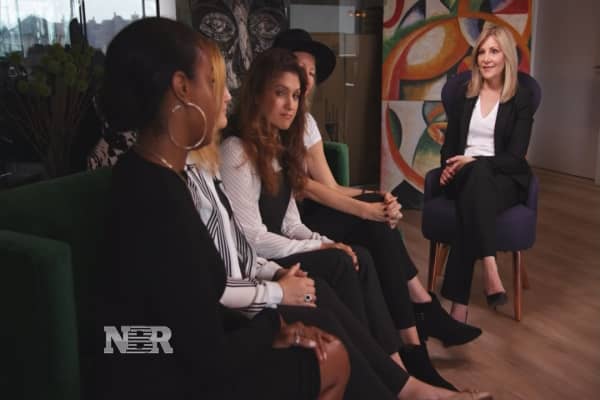
Women breaking barriers in crypto 3:02 PM ET Fri, 6 July 2018 | 02:40
From its start, the world of cryptocurrency has been dominated by males. In fact, men make up more than 91 percent of the bitcoin community, according to Coin Dance, a community for those interested in bitcoin.
But now, women are trying to change that.“
There’s a lot of wealth being generated, and a lot of times we're left out of the conversation. It's left to the males, the husbands, the partners, significant others, etc. But it's just as easy for us to get involved,” said Shanah Walton, an investor in crypto.
Walton calls herself the “Bitcoin Bombshell” and believes women can bring a lot to the space."My primary goal is… to promote diversity in the space, and get women involved and let them know it's not as hard or as nerdy or as techy as you would think it is," she said.
Walton is part of a weekly meet-up in New York City for women to share ideas and learn how to invest.The women gather over breakfast at a co-working space. CNBC was invited to attend a meeting which was packed with women of all ages and from all walks of life.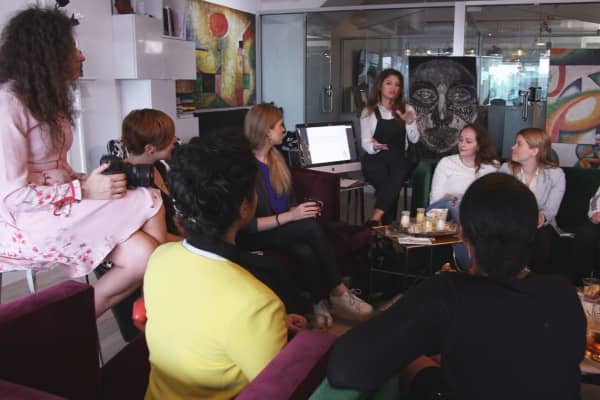
CNBC
Women discuss cryptocurrency over breakfast at a meeting in Manhattan.“The more and the more women that are getting into this space, the more excited they get and they understand at first that it's easy. It's totally doable. There's no magic thing that is going on that it's in difficult or more challenging for women,” said Erika Mouynes, a partner at Pixbae, a fintech advisory firm,who spoke at the meetup. “I'm in the hospitality industry.
That's my background for the past 12 years. So I have no financial experience, but I've been able to be very successful in the space,” Walton said.Meredith Davis is a former US Marine and worked in government for years. Now, at 7 months pregnant, she is working in crypto.“I had to go through mentally and realize that a lot of the barriers to entry that I thought existed were either remembered from times that don't really apply anymore,” Davis said.Many of the women at the meeting were moms.“
Most people I think that I've interacted with are working from home or a coffee shop or wherever is most expedient. So for moms, that's a huge opportunity,” Davis said.Moms say crypto gives them flexibility not found in other industries. “It’s a global market. It’s 24 hours.
So after the kids go to bed, you can get on your computer and do anything,” Walton said. Walton says she enjoyed working in hospitality, but that moving to crypto let her set her own hours and become self-sufficient. Davis and Walton are not the only moms jumping in. Marilyn DeLucenay started Crypto Moms, an online forum to get more women interested in crypto 4 years ago.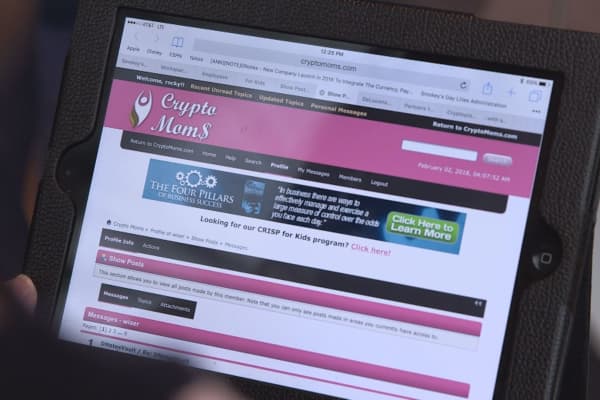
CNBC
Crypto Moms, an online forum for women to learn about cryptocurrency.“Ninety to 95 percent of the people that were involved or have been involved in the cryptocurrency have been men. And it's time that women started showing up to the table and become involved much more than they have been,” DeLucenay said.
Crypto Moms currently has 50,000 members and has seen membership grow by 25 percent, according to DeLucenay.The growing numbers are leading to increased confidence.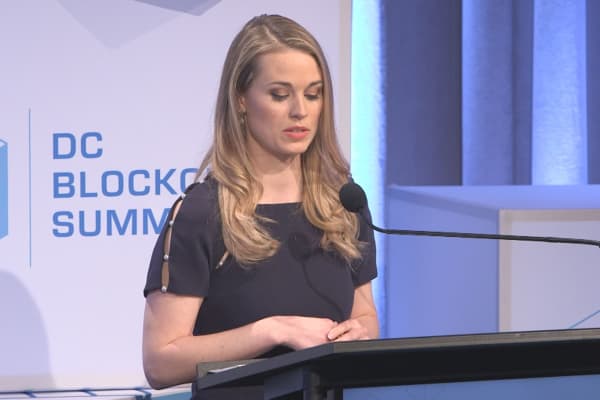
CNBC
Perianne Boring, the founder and president of the Chamber of Digital Commerce, speaks at the DC Blockchain Summit in March.
“For all of the women out there who have either wanted to enter this industry, who want to build in the blockchain ecosystem, who have faced misogyny or criticism, or have been trolled on social media, or made to feel like they weren't smart enough or good enough for any reason, you can do this,” said Perianne Boring, the founder and president of the Chamber of Digital Commerce, a blockchain advocacy organization.
Boring said in order for the industry to grow, more women are needed. “We're building the next level of the internet. A new operating system for government and society. And it takes all hands on deck to make this work.”-
Francisco Gimeno - BC Analyst We are always talking about blockchain being a revolutionary movement. In history all revolutions have been typically male dominated with some token female figures. It is time to understand that this shouldn't be the case. The real decentralisation of crypto and blockchain must affect everything everywhere by its own nature, and this include the natural presence of women in it. They don't need "an entrance". They need to be there because is a global democratic and inclusive revolution for everyone.
-
-
Use Case: Beauty and the Blockchain: This company aims to decentralize the cosme... (thenextweb.com)It’s never been a better time to be a beauty entrepreneur. Figures suggest that the Global Beauty & Personal Care Products market is expected to grow from $432.7 billion in 2016 to $750 billion by 2024, according to Inkwood Research.
Europe is expected to hold the largest market share, projected to be worth $225 billion in the next six years. Yet, despite the advancements in revenue, the beauty industry is one of the few markets that has yet to embrace the potential of digital technologies. Many beauty entrepreneurs remain in the 20th century by relying on telephone, and pen and paper to organize customer bookings.
Disrupting the existing market
For online beauty booking platform JOLYY, it is proposing a solution through the blockchain technology that will have huge potential for the industry such as increasing efficiency and faster payments, and lowering the cost of commissions for salons and clients.
Founded in 2016 as a way of improving business models for online beauty booking sites across Europe, JOLYY has already garnered popularity in the local market with the first version of its platform. Now, the online beauty platform intends to upgrade its system with the aid of the blockchain.
JOLYY’s mission is to disrupt the existing market for online beautys booking by providing an innovative and highly effective beauty booking system. This platform will be built on the Origin Protocol, which uses the ethereum blockchain, enabling buyers and sellers to interact with each other in an effective manner.
The new decentralized platform gives users the chance to book appointments 24/7, find the best prices for treatments, see the available days and hours, receive rewards, and pay in JOLYY’s native token, JOY for services or in the JOLYY store.
Additionally, salon managers will be able to compare themselves with their competitors because of the blockchain’s transparency, receive feedback from customers, and arrange for cosmetic deliveries in an easy, fully automated, and cashless environment via smart contracts.
Keeping on trend with the latest styles
In a first for the beauty industry, the online beauty booking service is offering a social network platform, the JOLYY live. This will be a social area where beauticians can upload pictures and comments about what they do in a salon each day.
Users can then follow their favorite experts, like comments, ask questions, upload and share videos of their own, and see the latest style trends both locally and worldwide. JOLYY live will also permit advertising, paid with JOY, which, in turn, will produce more demand and increase the price of the token.
Connecting beauty experts and cosmetic manufacturers
Inkwood Research suggests that the top market players in global beauty and personal care products are L’Oréal, Unilever, Procter & Gamble, Johnson & Johnson, and Estee Lauder. Consequently, beauty salons are purchasing their cosmetic products from trade representatives at these companies.
Through the JOLYY store it intends to connect manufacturers with salons directly with relevant product promotions to target audiences with zero percent mistargeted advertisements. Additionally, those running smaller companies who may not necessarily be able to afford huge advertising campaigns will still be capable of reaching targeted audiences.
Payment for goods ordered through the JOLYY store will be processed via smart contract once they have been delivered. It will then automatically proceed to the JOLYY app on a pre-set agreed schedule before being sent to the manufacturers. They can then either convert their JOY tokens into fiat or keep them and use them for purchases such as advertising on JOLYY.
Cutting high commissions
The beauty industry is a booming market, particularly among the young population. Data from research firm NPD, suggests that millennials are using 25 percent more cosmetics than they did two years ago, and significantly more than baby boomers. Yet for each beauty appointment booked, existing platforms are charging 20 percent commission.
For many salons this doesn’t make their business viable as they often have to wait weeks and months before receiving payments. JOLYY aims to solve this issue. Upon its launch, the platform will allow salons and clients to make bookings free of charge. At a later stage when there is a fully developed ecosystem JOLYY intends to introduce a one percent commission charge per appointment.
Popularizing cryptocurrency among female clients
Despite measures at increasing the number of women using digital currencies, they still remain a minority, JOLYY says, adding that women make up 70 percent of household purchase decisions and are responsible for $20 trillion in yearly consumer spending.
This figure is estimated to increase another 40 percent over the next five years. Yet for cryptocurrencies such as bitcoin to become widely accepted more women need to get on board. JOLYY is hoping to pioneer this change by introducing more women to the crypto world through the development of its platform, social networking, the JOLYY store, and its JOY token.
One of the key components of the platform launch is its native token, acting as the main payment choice across the platform. In total there will be 700 million JOY tokens allocated with 50 percent available for the pre-sale and public sale.
The pre-ICO is currently ongoing. A total of 30 percent will be reserved for the community and developer funds; 15 percent will go toward the company reserve; and five percent will be left for advisers, strategic partners, and bounties. Tokens used for advertising payments will be burned.

This post is brought to you by The Cointelegraph and is not an offering of securities or a solicitation to invest in securities. Yes, TNW sells ads. But we sell ads that don’t suck.
Discover more from a leader in tech publishing TNW here: https://thenextweb.com/cryptocurrency/2018/02/05/beauty-and-the-blockchain-this-company-aims-do-dece...
Help friends or someone you care about discover blockchain and
cryptocurrencies, by simply sharing this page. Don't keep it to
yourself.....share Blockchain Company (BC).
Did You Know About This?
You can curate a Personal Blockchain Page right here on Blockchain Company ( BC ) like these 2 great user examples here:
http://www.blockchaincompany.info/Paula
http://www.blockchaincompany.info/Francisco
Show
your blockchain page off to your employer, colleagues and friends. It
demonstrates your professional awareness and competency of this
revolutionary paradigm changing the world. It's free if you are a
consumer user. Just Create your Account here in less than 3 mins!
Or
Click Create Account above in the upper right corner. Instructions how
to curate your blockchain page from information you discover on BC, is
sent in your email after you sign up.
You might be able to capture your ' first name " unique url for your blockchain page too! Like : http://www.blockchaincompany.info/robert
You
may be entitled to cryptocurrency tokens, offers and discounts at any
time in the future once you are a user on our platform.
-
By
 Admin
Admin - 0 comments
- 2 likes
- Like
- Share
-
By
-
Bitcoin's eye-watering price surge over the past year is proving too tempting to resist despite fears that cryptocurrencies are a bubble floating towards an inevitable burst. One group for whom it holds particular appeal is African millennials, writes the BBC's Catherine Byaruhanga from Uganda.
Thirty year-old Peace Akware in Kampala is a convert to the cryptocurrency craze. Like any self-respecting middle class millennial here her smartphone is always within reach and with it her digital wallet."I check my Bitcoin every day and any chance I can get.
Any minute, any hour, anytime, as often as I can," she tells me from the small bungalow she rents on the outskirts of Kampala.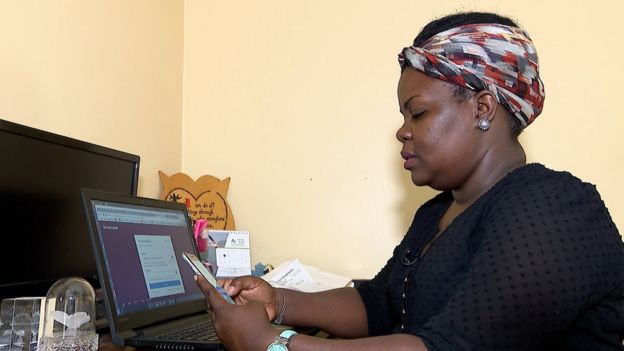
Image caption Peace Akware is hoping to buy a car with the money she makes from BitcoinFinding a job here is almost like a lottery for graduates so Ugandans often have so-called side hustles.
Peace has sold clothes and even got into money lending. Both failed.But buying cryptocurrencies like Bitcoin appeals to her because it requires less of her time and there are no upfront costs.
She's bought more than a thousand dollars worth of Bitcoin. So far the gamble is paying off and overall she is seeing her digital value rise."You know there's potential for it growing even further. I would like to buy a car. I would like to buy land. I would like to build with it."Disrupting remittances
It's not just those hoping to get rich quick who are getting in on the action.In parts of the continent - especially commercial hubs like Lagos, Nairobi and Johannesburg - a small but growing number of people are finding that cryptocurrencies offer a cheaper solution to an expensive problem - transferring funds across borders.
The technology platform Bitpesa uses Bitcoin as a medium to transfer cash across borders. It is like a remittance company.With traditional remittance companies like Western Union, when you transfer money initially it goes from your local currency into dollars then on the other side they receive dollars which are then converted into the local currency.
You lose a lot of money in that conversion.What Bitpesa does is substitute the dollars with Bitcoin.It is cheaper, especially when there is a shortage of dollars in the country or restrictions on accessing dollars.It is also quicker because you don't have to go through long complicated bank approvals.
Read more about technology in Africa:
 Image copyright
Image copyright
THINKSTOCK
Five African tech trends to look out for in 2018The computer that can smell explosivesAfrica needs more engineers and makersHow African governments block social media
Elizabeth Rossiello is the CEO of Bitpesa. Even as someone who knows how the finance world works, she gets frustrated with traditional banking."I've been in Nairobi for the past month and I had three big banking things to do.
"All three of these operations with three different Kenyan banks were cancelled for different reasons, or had delays or needed additional information so it took almost two-and-a-half weeks per transaction to get them finalised and I'm an expert.
"Bitpesa has been operating for four years now and has over 6,000 customers across the continent.It focuses on big-ticket transfers - for example, paying suppliers in China or employees in another country.
In Nigeria, when the government placed controls on access to the US dollar during a financial crunch, Bitcoin made it much easier for businesses to transfer cash abroad, something that has increased interest in cryptocurrencies in the country.
In places like Zimbabwe, where there has been political and economic instability, Bitcoin has become a place to store value, buy goods and services from abroad and crucially a vehicle for remittances from the diaspora.
Many central banks are sceptical.The Nigerian, Kenyan and Ugandan central banks have issued warnings about getting involved in the new and unregulated market.The governor of the Central Bank of Kenya went as far as saying digital currencies are a type of Ponzi scheme because of the way their value often fluctuates.Bitcoin classes
Martin Serugga, a sharply dressed currency trader in Kampala warns people to be cautious too.He says unfamiliarity about the new financial instruments could lead to criminals duping customers out of their money.
Nevertheless, he has started weekly classes with over 50 people attending to learn about cryptocurrencies and how to trade them against traditional currencies like the US dollar or British pound.He says high youth unemployment in Uganda is driving interest in Bitcoin and other products.
"If you don't have factory jobs and you don't have corporate jobs to serve the thousands of young people coming out of the universities this is an alternative," he says.
Mr Serugga's class is made up of equal numbers of men and women, who are mostly young.
They come to an upmarket coffee shop for their dose of the financial markets. The bright projector on the screen flashes numbers, graphs and bright colours.
Joachim Ndhokero, a recent economics graduate, is still unemployed.His father encouraged him to attend the classes to make some money but it has not been easy.He lost over $900 (£664) in a trade gone wrong.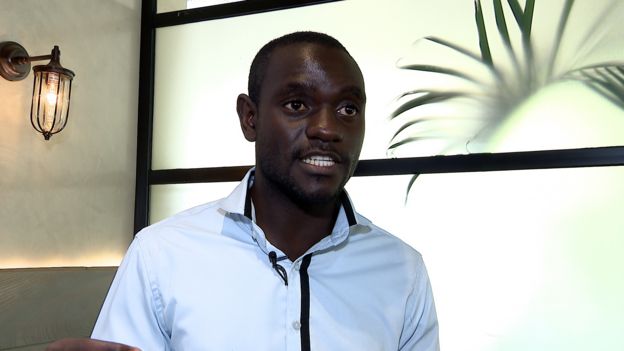
Image caption Mr Ndhokero lost everything within two hours
Before he lost all his money, he had just made a $200 profit.Then he went to the cinema and lost everything."I think it was within like two hours."That day I learnt that for cryptocurrencies, since they have a bigger spread, they can easily bring in losses. If it's a loss, it's really a loss."The expert advice here is "use what you can afford to lose".Blockchain magic
But it's not just the currency aspect of this technology that people think will transform the continent.Digital security expert Neil Blazevic sees the blockchain technology which underpins cryptocurrencies as the more important innovation.
Blockchain is a form of recording data that cannot be tampered with or hacked. It can be used for documents from contracts drawn up by lawyers to land registries.
He lists many more applications."If African developers, entrepreneurs, and governments can leverage blockchain technologies, they may have a shot at tackling some of the continent's most intractable problems of the unbanked masses, digital identities, untrusted voting systems, to name only a few applications," Mr Blazevic explains.
Media caption Karishma Vaswani takes a look at blockchain and explains how it works
"With the right support for innovation, and collaboration Africa could once again leapfrog over the digital divide and become a market leader just like it did in the move from landline communications infrastructure to the mobile phone ecosystem.
"One person who has fully embraced the African mobile phone revolution is Ms Akware.
She continues to watch over her digital wallet.She knows that the value of Bitcoin could fall at any moment.If all fails she will probably start again from scratch with a new venture.
For the moment she is holding on, hoping to buy her first car in two months.
If you've enjoyed reading this article and want to discover more from the BBC, click here: http://www.bbc.com/news/world-africa-42582343
Did You Know About This?
You can curate a Personal Blockchain Page right here on Blockchain Company ( BC ) like these 2 great user examples here:
http://www.blockchaincompany.info/Paula
http://www.blockchaincompany.info/Francisco
Show your blockchain page of to your employer, colleagues and friends. It demonstrates your professional awareness and competency of this revolutionary paradigm changing the world. It's free if you are a consumer user. Just Create your Account here in less than 3 mins!
Or Click Create Account above in the upper right corner. Instructions how to curate your blockchain page from information you discover on BC, is sent in your email after you sign up.
You might be able to capture your ' first name " unique url for your blockchain page too! Like : http://www.blockchaincompany.info/robert
You may be entitled to cryptocurrency tokens, offers and discounts at any time in the future once you are a user on our platform.
-
By
 Admin
Admin - 0 comments
- 2 likes
- Like
- Share
-
By







